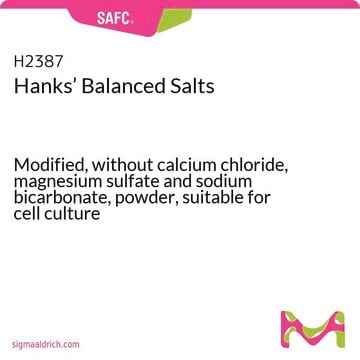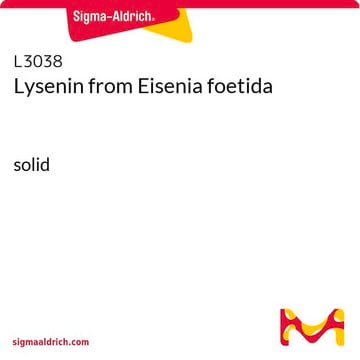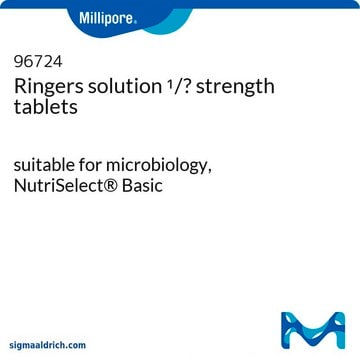H4385
Solution saline équilibrée de Hank solution
10 ×, Modified, without calcium, magnesium or sodium bicarbonate
Synonyme(s) :
HBSS
Se connecterpour consulter vos tarifs contractuels et ceux de votre entreprise/organisme
About This Item
Code UNSPSC :
12352107
Nomenclature NACRES :
NA.47
Produits recommandés
Niveau de qualité
Concentration
10 ×
pH
5.8-6.0
Application(s)
hematology
histology
Température de stockage
room temp
Vous recherchez des produits similaires ? Visite Guide de comparaison des produits
Description générale
Hanks′ Balanced Salt solution (HBSS) is a cell and tissue culture solution. It is widely recommended for cell maintenance and conservation of tissues for a longer period. In addition, HBSS is used as a wet storage media for avulsed teeth, as it has the ideal osmolality and physiological pH for preserving the vitality of cells.
Application
Hanks′ Balanced Salt solution (HBSS) has been used for the elimination of the epithelial layer from the leukocytes and lymphocytes from the colon cells. It has also been used for the isolation of quail spermatozoa
Conditionnement
Contains: NaCl, 80 g/L; KCl, 4 g/L; glucose, 10 g/L; KH2PO4 600 mg/L; Na2HPO4 475 mg/L and phenol red, 170 mg/L
Autres remarques
pH 6.9 when diluted according to instructions. Osmolality 240-250 mOsm/Kg.
Code de la classe de stockage
12 - Non Combustible Liquids
Classe de danger pour l'eau (WGK)
WGK 2
Point d'éclair (°F)
Not applicable
Point d'éclair (°C)
Not applicable
Certificats d'analyse (COA)
Recherchez un Certificats d'analyse (COA) en saisissant le numéro de lot du produit. Les numéros de lot figurent sur l'étiquette du produit après les mots "Lot" ou "Batch".
Déjà en possession de ce produit ?
Retrouvez la documentation relative aux produits que vous avez récemment achetés dans la Bibliothèque de documents.
Les clients ont également consulté
Shusei Mizushima et al.
Methods in molecular biology (Clifton, N.J.), 1650, 243-257 (2017-08-16)
A characteristic biological property of avian gamete (e.g., extremely large egg and polyspermic fertilization) does not allow the direct observation of sperm-egg interactions in vitro, but recent research advances make it possible to manipulate the gamete in vitro. Here, we
Athina-Myrto Chioni et al.
Methods in molecular biology (Clifton, N.J.), 1487, 255-267 (2016-12-08)
Organotypic models are 3D in vitro representations of an in vivo environment. Their complexity can range from an epidermal replica to the establishment of a cancer microenvironment. These models have been used for many years, in an attempt to mimic
Wilson Roberto Poi et al.
Brazilian dental journal, 24(5), 437-445 (2014-01-30)
Dental avulsion is the most severe type of traumatic tooth injuries because it causes damage to several structures and results in the complete displacement of the tooth from its socket in the alveolar bone. The ideal situation is to replant
Xiu-Li Kuang et al.
BMC neuroscience, 11, 137-137 (2010-10-26)
Neuron-derived neurotrophic factor (NDNF) is evolutionarily well conserved, being present in invertebrate animals such as the nematode, Caenorhabditis elegans, as well as in the fruit fly, Drosophila melanogaster. Multiple cysteines are conserved between species and secondary structure prediction shows that
Györgyi Műzes et al.
Comparative immunology, microbiology and infectious diseases, 52, 48-57 (2017-07-05)
The influence of cell-free DNA (fDNA) administration on the TLR9-autophagy regulatory crosstalk within inflammatory circumstances remains unclear. To examine the immunobiologic effects of iv. fDNA injection on the TLR9-mediated autophagy response in murine DSS-colitis. Different types of modified fDNAs were
Notre équipe de scientifiques dispose d'une expérience dans tous les secteurs de la recherche, notamment en sciences de la vie, science des matériaux, synthèse chimique, chromatographie, analyse et dans de nombreux autres domaines..
Contacter notre Service technique








